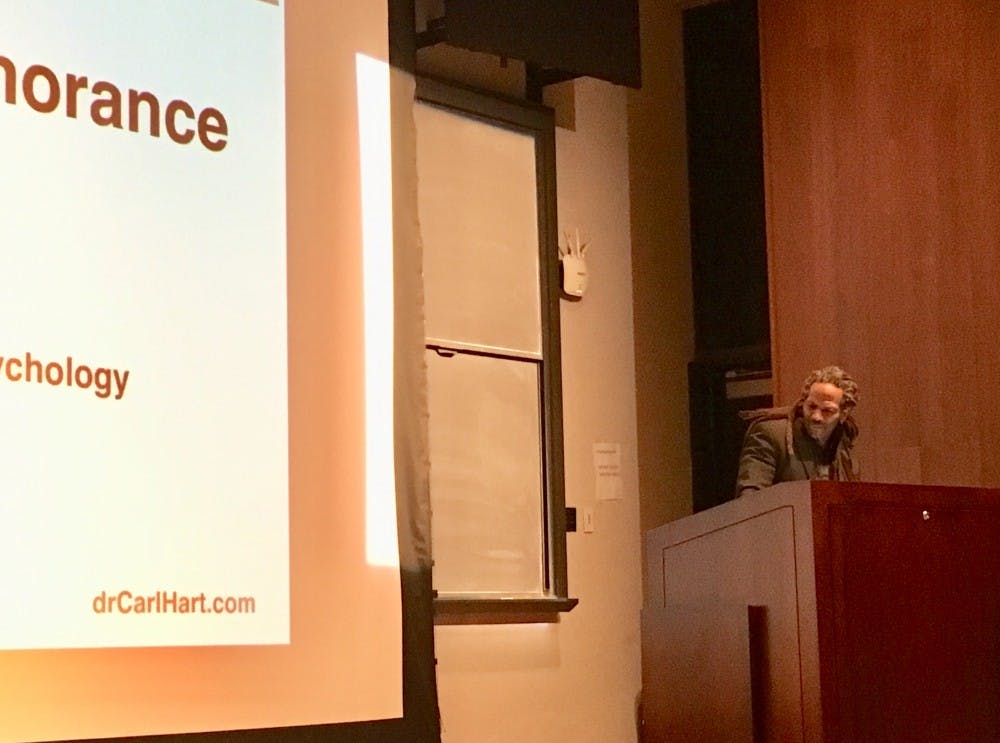Chair of the Department of Psychology at Columbia University Carl Hart said Thursday that U.S. society critically misunderstands drugs like opioids. The entire lecture hall was full, and overflow audience members sat in another room watching a live-stream.
“Drug education in America is primarily miseducation,” Hart said. “The American public is constantly bombarded with lurid misinformation that isn’t designed to educate [but] to terrify.”
Audience members frequently responded with laughter to Hart’s unique judgements of society.
Hart explained that even though the public is concerned with the dangers of opioids and drug overdose, the statistics on drug overdoses, according to Hart, are either often understood in the wrong context or fail to show the whole story.
According to Hart, in 2016, heroin usage was linked to 15,000 deaths, and in the same year, 38,658 deaths were linked to guns and 37,000 deaths to automobile accidents. Hart pointed out that, although more deaths resulted from car accidents than from heroin usage, there are no bans on cars.
Hart added that suicide could also be an alternative cause of a drug-related death, but it is almost never considered.
Furthermore, people rarely die from the overdose of a single opioid, explained Hart. He said that more than 75 percent of heroin-related deaths are due to combined usage with other sedatives, such as alcohol, benzodiazepines, nerve pain medications, or anticonvulsants.
Most people who use opioids need “honest education,” explained Hart.
“People are not dying because of opioids,” wrote Hart in his 2017 article for Scientific American. “They are dying because of ignorance.”
Moreover, addiction to drugs is not as common as what the public believes. Hart stated that 75 to 90 percent of drug users do not become addicted. Instead, Hart characterized many drug users as “respectable people” who “pay taxes,” “care about their communities,” and contribute to society.
He added that U.S. presidents Obama, Clinton, and George W. Bush all used illicit drugs in their youth.
According to Hart, another common misconception is that drug use is completely irrational. However, he pointed out that heroin, like alcohol, is used as a “social lubricant,” something that helps people feel more comfortable in social situations. Heroin can also be a pain reliever, induce euphoria, and improve sleep quality, said Hart.

To target drug usage in the United States, Hart pointed to four practical solutions: education about the effects of specific drug combinations; the set-up of free, anonymous drug-purity testing services; supervised consumption facilities; and the legalization of certain drugs.
Hart explained that Spain, the Netherlands, and Austria already offer drug purity testing services, which allow users to submit drug samples and receive a breakdown of the substance. The breakdown then allows users to understand what they are consuming and, thus, how much they should be consuming.
According to Hart, supervised consumption facilities would provide users with clean needles and on-call nurses in cases of overdose.
He also pointed to the possible success of legalization by referencing how Colorado’s legalization of marijuana in 2012 caused marijuana arrests to decrease dramatically.
However, current solutions are misguided because “[they] allow us to avoid dealing with the real problems of the poor,” such as unemployment, poor housing, homelessness, substandard education, and low income, Hart explained.
“It’s a lot more simple to say, ‘I’m going to rid your community of heroin’ than it is to deal with the rest of these real issues,” said Hart.
Hart added that current drug solutions “allow us to target people that we don’t like without explicitly saying so.”
He explained that over 80 percent of those sentenced for usage of crack cocaine are black and that the opioid crisis “provides another opportunity to exert racism in drug law enforcement.”
“The drug problem has little to do with drugs,” Hart added. “It has everything to do with economic and political opportunity, the subjugation of despised groups, apathy — even contempt — toward [the] less fortunate.”
The lecture was a part of the Moffett Lecture Series, which aims to foster reflection about moral issues in public life. The series was made possible by a gift from the Whitehall Foundation in honor of James A. Moffett ’29.
The lecture was held on Sept. 27 at 4:30 p.m. in McCormick 101. An interdisciplinary workshop on drugs and addiction will follow on Sept. 28.








